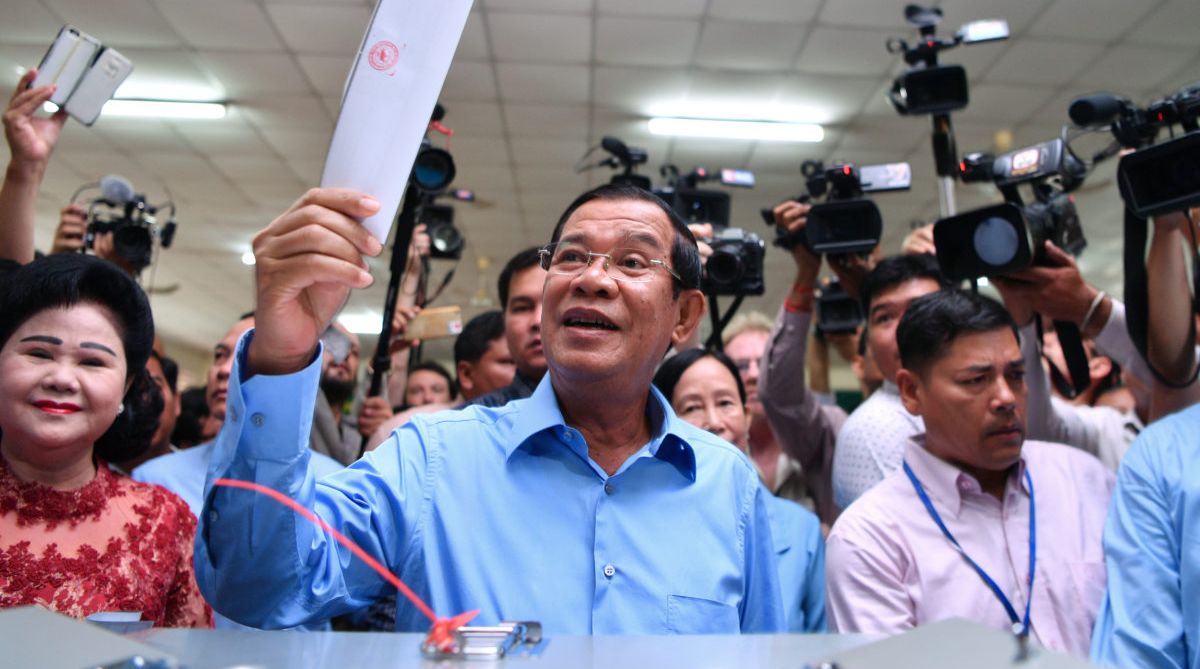Cambodian voters went to the polls on Sunday and handed Prime Minister Hun Sen, Asia’s longest-serving leader, another five years in power in a controversial election that many observers deemed a “sham”.
It was a landslide victory. Early estimates indicate that Hun Sen’s party, the Cambodian People’s Party, may in fact have won every single seat in the National Assembly which would mean the country is now, effectively, a single-party state.
Advertisement
The results of the election should come as no surprise to anyone who has been following Cambodian politics for the past year. The only viable opposition party was dissolved by court order in November of 2017, and dissenting voices have been systematically silenced as part of an ongoing crackdown on critical media and civil society.
Former leaders of that opposition party, the Cambodia National Rescue Party, had called for a boycott of the election, asking that voters keep a clean finger, a reference to the indelible ink applied to the index finger of those that cast a ballot. What Hun Sen craved most from this election was legitimacy, and a low turnout would have robbed him of that.
Hun Sen, and those that support him, will point to the numbers from election day and claim they equal a mandate. The National Election Commission has reported that around 80 percent of registered voters cast ballots. But that figure belies several key details.
Leading up to the election there were widespread reports of voter intimidation—with bosses telling workers they would be punished if they did not come back to work with an inked finger, and some local authorities reportedly threatening to deny essential government services to election boycotters.
Some reports indicated that Cambodians who felt they had no option but to get their finger inked, would show up to polls only to spoil their ballot. Indeed early statistics indicate that up to 9 percent of the ballots have been counted as spoiled—the ballot crossed out entirely, every box checked, the ballot left empty, etc. In former CNRP strongholds like Phnom Penh that number was even higher. There, 14.4 percent of votes cast were invalid, a huge spike compared to just 0.99 percent in 2013.
In fact, the entity that got the second-most votes after the CPP—and ahead of the 19 other minor parties that were on the ballot—was the “spoiled vote party”.
And since credible third-party observers refused to take part in the process, all this took place under the questionable eyes of what some experts have labeled “zombie election monitors”.
For the people of Cambodia, five more years under Hun will likely bring about an intensification of the status quo. Further limitation on free speech and the free press, economic development that largely benefits the country’s wealthy elite and fails to trickle down to the average Cambodian, and a government that is even less accountable to its citizens.
And for the wider region, it is expected that the next half-decade will see an even closer relationship between Cambodia and China. This election, with all its controversy, has driven the wedge between Cambodia and the United States and Europe even deeper. And Cambodia is expected to be pulled even further into China’s orbit if the country is cut off from the tariff-free access to American and European markets it currently enjoys.
China has not been subtle in its assessment that a Hun Sen victory is in its best interest—the Chinese ambassador was given a prominent position on the stage for at least one CPP campaign rally. He did not attend the rallies of any of the other minor parties on the ballot. Cambodia gets financial support out of this arrangement in the form of loans and investment for large-scale infrastructure projects and China gets a vocal champion for its strategy in the region.
Hun Sen has indicated that these next five years won’t be the end of his rule. In speeches, he says that he intends to stay on as Prime Minister for at least a decade longer. And beyond that, it is expected that he will do everything within his ever-expanding powers to see that the next leader of Cambodia comes from his own family.
The most likely outcome is that he will try to pass the torch to one of his sons, either Hun Many, 35, who currently runs the CPP’s youth wing, or his eldest, Hun Manet, 40, who has risen through the ranks of the Royal Cambodian Armed Forces and is now a four-star general.











